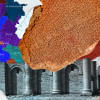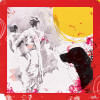Mundanities, magic realism, Bangladesh—Shahidul Zahir’s novellas

During a sticky day in Dhaka, where crisp autumns in the hues of burnt orange do not exist, I found myself attending an afternoon lecture on the various shapes a narrative can take. Our professor, in explaining the concept of dhikr in the Sufi tradition and the repetitive phrases found in Ghulam Ali's ghazals, went around the room in spherical motions—asking us in turns to think of stories which imitate the arcs of a circle.
Ever since that day, my subconscious took on a knack for labelling certain shapes to every book I read; the exercise never becomes dull. Arthur Miller tragedies would always morph into Aristotelian triangles of unities; Kafka's "The Burrow" (1931) resembled a tunnel which floated, and it seemed, in a vacuous state of rubble, animal dirt and obsessive rattling. Every Calvino I picked up and oftentimes dropped would be a many layered, meandering stacks of rectangles spiked on top of one another; and Woolf would happen to be a viscous blob of sea-water mixed with honey. Haikus resembled teardrops and epics appeared like the symbol of ouroboros.
The minute I finished Shahidul Zahir's Life and Political Reality (Samhati Prokashan, 2022), the first novella in the collection published elsewhere in South Asia by HarperCollins India and translated by V Ramaswamy and Shahroza Nahrin, I wanted to take up a paintbrush and draw a couple of ominous, circles all lapping into one another, perhaps smeared with flecks of white poplin and flashes of hibiscus red.
Like the unforeseen rip and the "phot" with which Abdul Mojid's footwear breaks away in the beginning of Shahidul Zahir's Life and Political Reality (Samhati Prokashan, 2022), translated from Bangla by V Ramaswamy and Shahroza Nahrin, the readers too are dropped like egg-yolks within the sprawling, caustic narrative of Zahir's story. A split in time occurs as our protagonist scuffles through his dismal memories of 1971. Tortuous branches of prose flow through the fabric of history, intertwined with the debris of appalling cruelty, navigating eddies of crises, and setting off flash floods of collective remembrance. This novella examines the war, keeping the focus narrow, on a particular mohalla but exploring the destruction of idealism and the spirit of frustration encompassing Bangladesh in her post-war years. Thus the personal space is the same as the political sphere, the individual on the same strand as the collective.
Through the use of anaphoric instances, Zahir stamps certain images in the reader's mind. Mojid's sandal straps, the inauspicious dispersion of cut flesh to the ravens by Moulana Bodu, the murder of Momena, and Mayaraani's incantations to God Shani are some of the snapshots among many others which reemerge through the span of the novel. These images in turn work as a kind of hook for the readers to rely on and to get hold of where the story is headed. Hence the narrative is not necessarily an open-ended stream of consciousness, one that moves from point A to B, from B to C and so on—but one which circumnavigates, touching all the points and creating many intersections. It might sound chaotic, yet it is anything but, as nothing becomes repetitive or cacophonous, let alone monotonous.
The themes and the distinctions of the plot—the substance, so to speak—tend to fall flat to Zahir's grasp over style. Instead of aligning itself with a steadfast arc or a steady plotline, the story moves restlessly through the treacherous terrains of time and space. Without a single break in the paragraph, Life and Political Reality hovers over readers like a massive cloud of text formed with a deft pen.
Abu Ibrahim's Death, the second novella in the collection, may seem like an odd choice for Life and Political Reality's accomplice, in so far that it is a text that is riffed with the occurrences of everyday life. The story opens with the death of Abu Ibrahim and then reverts into the life he lived. We see him in different roles, an absent spouse, a loving father, a righteous government worker.
The protagonist is someone who acts as a shadow of Maoist, Marxist morality. However, when offered a bribe by a businessman, a Shylockian figure who is cartoonish and sinister with his talks of whiskey and money-making, Ibrahim's conscience gets a hold of him. He stands against the culture of taking backhanders but simultaneously is afflicted with a burden to buy land for his own family. He does not resist the man, however, with a bellowing horn of an idealist hero like the doctor in Satyajit Ray's Ganashutra, but with a steely, quiet rumination which infuriates the shady merchant. First published in 1991, the political context of then-Bangladesh and the zeitgeist of uncertainty and disillusionment are captured through Ibrahim's struggle of navigating his principles in a fractured world.
While reading Abu Ibrahim's Death, I was surprisingly reminded of Wong Kar Wai's meditations on Hong Kong's urban spaces—the pages saturated with aching glances, quiet longings which become deafening in unsaid words. Zahir draws up a shade of Dhaka abloom with flame flowers and a kind of tranquillity that appears to be a myth in this present day.
However, despite the dreariness of the themes, there are instances in both novellas which act as a celebration of unobtrusive, everyday beauty. From Ibrahim's act of savouring an ice-cream with his daughter, to Abdul Mojid choosing not to become a gunda when he finds access to the doors of the neighbourhood library—it all adds an emotional, wistful tuning to the callous realism and the indisposition of cut flesh and horror.
Shahidul Zahir's expertise lay not only in the depiction of social reality or the nuances of local culture, but in the experimental language he opted for, in his play of dialogues and dialects. In case of the translation of Abu Ibrahim's Death, the dialects were not translated like in Life and Political Reality. The inclusion of that would have perhaps helped to draw a better picture of the characters, given an indication of their social class too.
While the Bangla, original renditions of the two pieces evoke a certain sense of maya, the English versions do not fall short. Ramaswamy and Nahrin provide worthy translations of these masterpieces, concurrently holding the audience haunted and mesmerised.
Jahanara Tariq is Adjunct Lecturer at Independent University, Bangladesh (IUB).

 For all latest news, follow The Daily Star's Google News channel.
For all latest news, follow The Daily Star's Google News channel. 










Comments